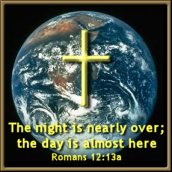
|
The Posttribulation RaptureThe majority of those holding the posttribulation rapture believe the church will enter the seven-year tribulation period and just prior to the Second Advent be raptured and return immediately to the earth with the Lord. Douglas J. Moo, in his argument for posttribulationism, states: "The fact that believers at a posttribulational Rapture would rise to meet the Lord in the air only to return immediately to earth with Him creates no difficulty, for the text does not state that believers will go directly to Heaven, but only that they will always be with the Lord."
Some posttribulationists view the entire present age as the tribulation, although the majority accept the literal interpretation of the tribulation period as a portrayal of actual events preceding the Second Advent. J. Dwight Pentecost comments:
The essential arguments of the posttribulationists include: (1) "the historical argument" (that the pre-trib view is a new teaching and should be discarded); (2) "the argument against imminency"; (3) "the promise of tribulation" (this relates to Israel and not the church, except in a non-technical sense); (4) "the historical fulfillment of Daniel 9:24-27"; (5) "the argument from resurrection" (that the Rapture and resurrection are linked together; cf. Dan. 12:1-3 concerning the resurrection of the OT saints); and (6) "the argument from the wheat and tares" (cf. Matt. 13:30)."
John Walvoord contends that, "the church is never found in any portion of Scripture dealing with the time of the tribulation, and the translation of the church is never mentioned in any passage picturing the return of Christ to set up His millennial kingdom." Walvoord goes further to say that "posttribulationism is built principally upon the identification of the church with tribulation saints, a conclusion which is without substantiation in Scripture."
| |
| Copyright © 2001 - 2023, Prophecy Forum, All Rights Reserved. | ||